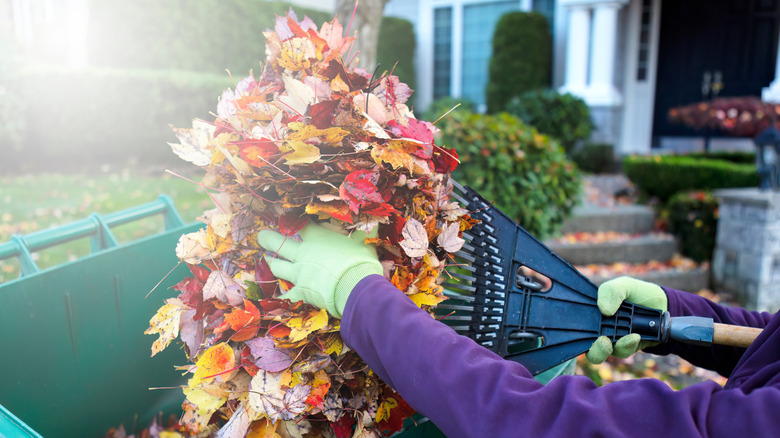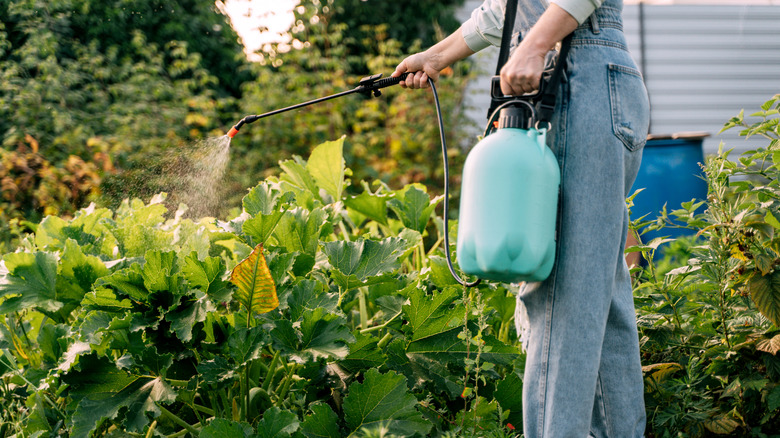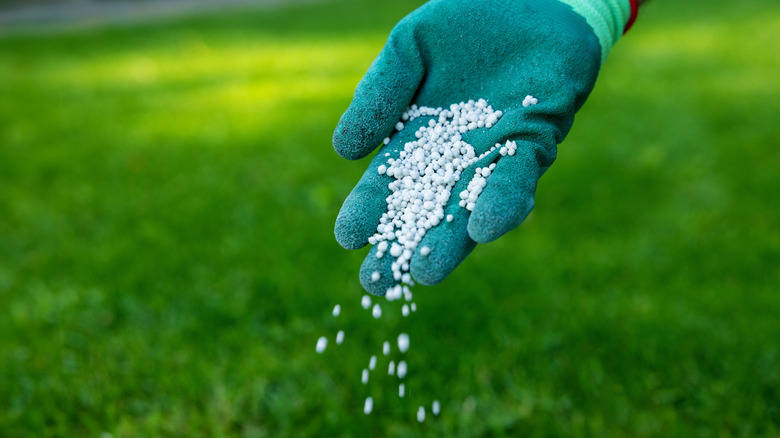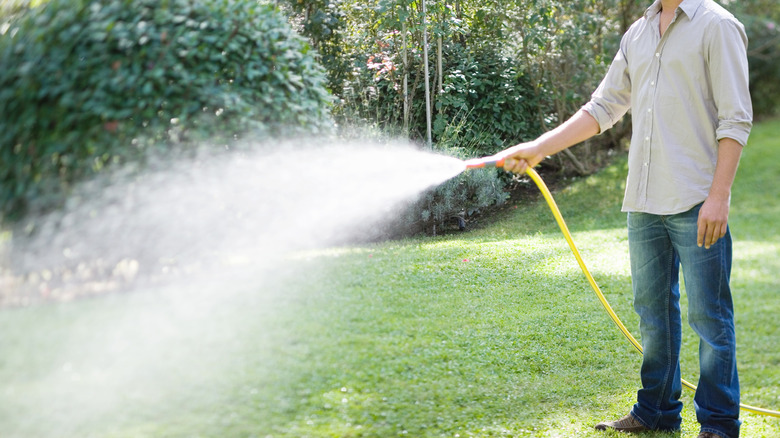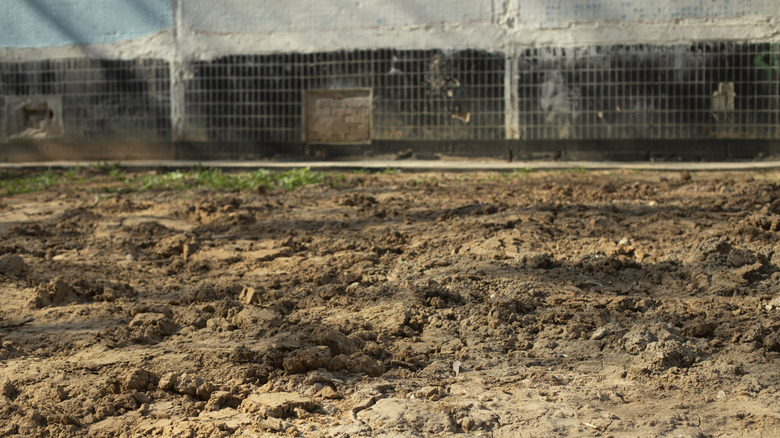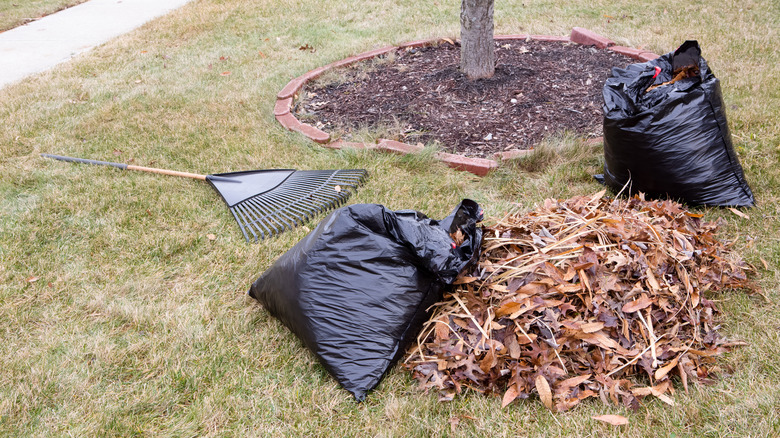Gardening Trends That Deserve To Fade Away In 2025
2025 is just around the corner. Whether you're a seasoned gardener or a newbie feeling overwhelmed with tons of sometimes contradictory advice, there are some gardening trends and habits that are better left behind as you enter the new year. No matter what kind of landscape you're trying to cultivate, you can make your gardening life easier and more affordable by ditching bad habits like over-using pesticides and fertilizers or painstakingly raking leaves and sending them to the landfill.
Not only are old habits like these usually unnecessary, but they can also end up creating more work for you later. Spraying pesticides now can create conditions that allow pest populations to explode down the road. Eradicating weeds to maintain a monoculture lawn can make your grass more vulnerable to pests and disease. In many ways, the less you do and the fewer chemicals you add, the healthier your garden will be in the long run.
Even if you want the pristine look of a well-manicured landscape, ditching some of the more tedious and expensive gardening trends of the past is the way to go. The truth is, you don't need to eradicate every bug or achieve the perfect ratio of nitrogen, phosphorus, and potassium to keep your lawn and garden healthy and vibrant. So, ditch these gardening trends and replace them with smarter, more sustainable habits that help your garden thrive while you do less work.
Routinely using pesticides
It's tempting to reach for the bug spray the second you spot on something crawling on your plants. But using pesticides routinely doesn't work, and can make your problem worse in the long run. Pesticides often kill pests along with their predators. Creating this imbalance can cause pest populations to explode later, as there are little or no predators left to keep them under control naturally. Using pesticides every year can also cause the pests you're fighting to develop resistance to that chemical.
Apart from derailing your pest control efforts in the long run, pesticides usually aren't necessary. Most bugs are either beneficial or neutral visitors to your garden. Even those that gardeners most often think of as pests aren't as bad as you might think. Aphids rarely actually kill the plants they feed on. Grubs won't do serious damage to a lawn unless their population exceeds about 8 grubs per square foot. Wasps act as both pollinators and predators in your garden.
When pest populations get out of control, non-chemical methods are usually the better long-term solution. For example, adding a wider variety of plants to your garden can attract predators and make it harder for pests to find their target plant. You can also plant trap crops to draw pests away from your garden beds. Rotate through different species in your veggie garden or flower beds so that any pests from the previous year won't have a host plant to feed on this season.
Using fertilizer regularly
Fertilizers promise lush lawns, prolific blooming, and an overall vibrant garden. While they can deliver on those promises, they also come with some important disadvantages. To start, synthetic fertilizers are usually highly concentrated and fast-acting. This makes it easy to apply too much to your plants, causing fertilizer burn. Even when applied according to manufacturer's instructions, they can stimulate excessive growth, providing a buffet of tender, young shoots that are more vulnerable to disease and more attractive to garden pests.
The fast-acting formula of many synthetic fertilizers also depletes quickly, leaving your soil just as nutrient poor as it was before. And whatever doesn't get used by your plants can end up running off, contaminating waterways and harming fish. In reality, fertilizers usually aren't necessary. Most plants growing in the ground don't really need any fertilizer. The ones that do may not need as much as the package recommends or may benefit more from a slow-release, organic option like compost or bone meal.
Instead of spending money on fertilizer each year, add organic matter that can improve soil texture while also building up nutrients. This organic matter can come from compost, lawn clippings, fallen leaves, or organic mulches like wood chips and straw. You can also improve soil health and eliminate the need for fertilizers by cutting back on tilling. Tilling can make compaction worse. It also harms the microorganisms that live in the soil and help deliver nutrients to plant roots.
Maintaining monoculture lawns
In 2025, let's say goodbye to the monoculture lawn. The traditional goal of maintaining a healthy lawn made up of a single, often non-native grass species is impractical and usually doomed to fail. Just as in farming, single crops are more likely to suffer because of pests and diseases.
Also, lawns usually span a variety of growing conditions, from sunny and dry to shady and soggy. You're unlikely to find a single grass species that will thrive equally in all of those conditions. That's why, in a monoculture lawn, weeds are likely to take over in the areas where your grass struggles. Fighting these weeds involves following a meticulous regimen of pre-emergent and post-emergent herbicides followed by reseeding the bare patches season after season.
This year, instead of going through all the extra effort of eradicating anything that isn't grass, just embrace the weeds. They're filling in the spaces where your grass can't thrive in — let them. Some so-called "weeds," like white clover, are actually great companion plants for grass. Others can help you identify soil conditions so you can choose a more suitable ground cover species. If plantain weeds keep coming back in your yard, for example, it could indicate poor drainage or low soil fertility. To give your lawn a clean-cut, uniform appearance despite weed growth, just mow it as you normally would.
Leaving empty space in the garden
Some gardeners like the tidy look of a minimalist garden with lots of empty space. But even if you like an uncluttered landscape, you should never leave any of your soil bare. Bare soil is vulnerable to erosion, compaction, and flooding. It also creates the heat island effect, which can kill microorganisms in the soil and contribute to climate change. Another risk to gardeners with bare soil is weeds. If you don't fill in the area with plants you like, weeds will fill in the area for you.
To save yourself the tedious work of endless weeding, start filling in the spaces between plants with ground cover species or layer in other ornamental plants that complement your existing landscape. If there's a spot you've left bare simply because the conditions are too challenging for most plants, get creative. From gorgeous shade-loving ground covers to drought-resistant flowers that will thrive in scorching heat, there is a plant for every space. Even if you don't want to plant anything in that space just yet, you can improve soil health and help suppress weeds by simply covering the area with an organic mulch, like woodchips or pine straw.
Throwing away your leaves
Raking your leaves and then bagging them up to be picked up and dumped is tedious work. It's also terrible for your garden and the planet. By skipping raking, you let your soil store up to 32% more carbon than it can with the leaves removed. In addition to keeping that carbon out of the atmosphere, locking it in the soil helps improve the soil's structure, fertility, and moisture retention.
Leaves are also powerhouses for your garden. While intact, they shelter overwintering insects, some of which will become pollinators and predators that help your plants thrive next spring. As the leaves decay, the nutrients locked in them return to the soil, helping feed your garden so you're less reliant on fertilizer. Basically, leaves are like free fertilizer and soil conditioner in one. And all you have to do to enjoy these benefits is not rake this fall.
If the leaf litter is so thick you're worried it might smother your lawn, rake just enough that you can see your lawn underneath. Keep the rest in a pile where the leaves won't interfere with your grass but can still shelter overwintering insects and decompose into compost. If you live in an HOA that won't allow you to keep the leaves on the ground, double-check the requirements to find a workaround. Raking them into your flower beds or keeping the pile in your backyard might be enough to comply with the rules.
